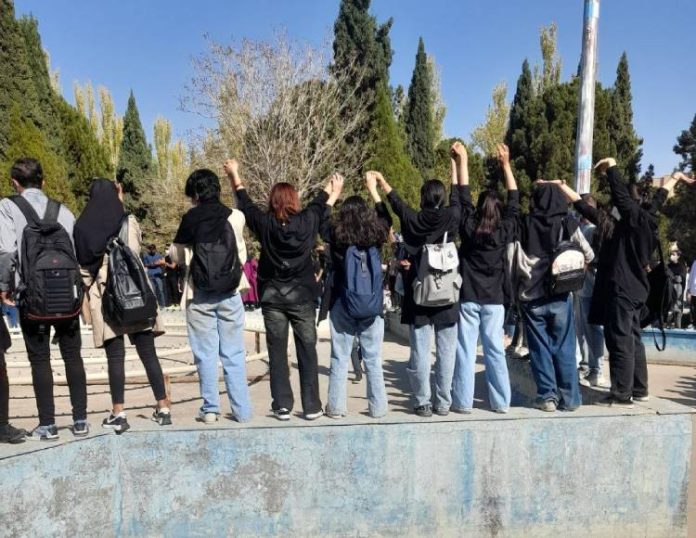The Iranian authorities have escalated their arrests and harassment of women’s rights campaigners ahead of the anniversary of the death of 22-year-old Mahsa Jina Amini, according to an Aug. 21 report by the Norway-based organization Center for Human Rights in Iran (CHRI). Authorities are also said to have suspended academics for supporting student protesters.
Amini was arrested by Iran’s morality police in September 2022 for failing to observe the country’s compulsory hijab law. According to United Nations officials, Amini was tortured while in police custody, and later died of her injuries.
Her death on Sept. 16 sparked nationwide protests in Iran which began with calls for gender equality and quickly grew to include demands for better pay and living conditions, and regime change.
At least 22 gender equality advocates have been arrested in recent weeks, most of them women. The arrests come amid concerns by officials that a second wave of anti-government protests could erupt in September.
“Iranian authorities are rounding up activists around the country, especially women, to deliver a message of fear to the populace ahead of the one-year anniversary of the ‘Woman Life Freedom’ protest movement: stand up again, and we’ll crush you,” Hadi Ghaemi, the executive director of CHRI said.
Iran’s Intelligence Ministry is also alleged to have pressured 12 of the 22 women’s rights advocates detained in Gilan Province to make forced and false confessions, according to an Aug. 30 report by the Radio Farda media outlet.
Sources speaking to the online media outlet said that women had been asked to “fabricate scenarios” to build legal cases against them, and that several of the women had experienced “intense interrogation pressure and physical abuse.”
“We are seriously alarmed about the arrests, temporary detentions, physical assaults and legal actions against human rights defenders in Iran in advance of the anniversary of the September 2022 protests,” said Front Line Defenders (FLD), a Dublin-based organization protecting human rights defenders. “Front Line Defenders is particularly concerned by the breach of international human rights law in Iran’s treatment to human rights defenders, where hundreds of human rights defenders have been arrested, charged and subjected to hefty prison sentences without adherence to due process or fair trials.”
Iran Regime Violations May Amount to Crimes Against Humanity – UN Expert
Human rights defender Atekeh Rajabi was sentenced to six months in prison on Aug. 21 after the publication of social media posts on violence against young protestors, the poisoning of school girls in Iran, prisoners’ rights and teachers’ rights.
She was charged with “propaganda activities against the state” by branch 7 of the Mashhad Revolutionary Court. She had been fired from her teaching job on Nov. 21 for taking part in the protests. Rajabi told FLD that she had not received a court summons, and that she and her lawyer had been denied access to her court files.
Professors at Iranian universities have been suspended for enabling student protests and encouraging female students to remove their hijab, according to a professor speaking on condition of anonymity to Radio Farda, in an Aug. 30 report.
At least 10 Iranian professors were removed from their teaching positions on Aug. 29 for supporting students’ anti-government protests and allowing female students to remove their hijab, according to social media accounts of two of the suspended teachers.
A report by the Student Guild Council of Iran confirmed the removal of seven professors from the Faculty of Literature at the University of Tehran, according to an Aug. 29 report by Radio Farda.
Dr. Ameneh Aali, a faculty member at Allameh Tabatabai University’s Department of Psychology, was told about her dismissal on Aug. 26 during a phone call. Aali had been supportive of student sit-ins, and advocated for students who had been suspended.
“We teachers cannot and should not be obedient followers of governments,” Aali wrote in an Aug. 28 open letter. She added that she was particularly worried about young people “during this time of suppression, arrest and suspension of students, attacks on schools and threats to students in letters and statements.”
[aesop_image img=”https://kayhanlife.com/wp-content/uploads/2023/03/2023-03-02T081118Z_202464781_OWSPLP22NEEFFXPCKBIOQVNJYIZJ3GN_RTRMADP_BASEIMAGE-960X540_IRAN-SCHOOL-POISONING.jpg” panorama=”off” align=”center” lightbox=”on” captionsrc=”custom” caption=”FILE PHOTO: Dozens of students were poisoned in the mystery attacks, and many taken to hospital. Paramilitary members of the Iranian Revolutionary Guards Corp were blamed for the attack. Iranian human rights groups say these attacks are the IRGC response to anti-regime protests made by schoolgirls. REUTERS./” captionposition=”left” revealfx=”off” overlay_revealfx=”off”]
Ali Sharifi Zarchi, a high profile academic and professor of bioinformatics and artificial intelligence at the Sharif University of Technology, announced his dismissal on X, the social media network previously known as Twitter, in an Aug. 26 post.
In the post, Zarchi said the university’s explanation that he had been fired for failing to extend his contract was false. He attached documents which appeared to refute the claim, and said: “The truth has been sacrificed for politics.”
A list of all the academics removed from their posts since 2006 was published on Aug. 24 by the reformist newspaper Etemad. The article said “58 professors were fired, suspended, arrested, summoned or forced into early retirement from the beginning of the 13th government (headed by Ebrahim Raisi) from Aug. 2021 to Aug. 2023.”












